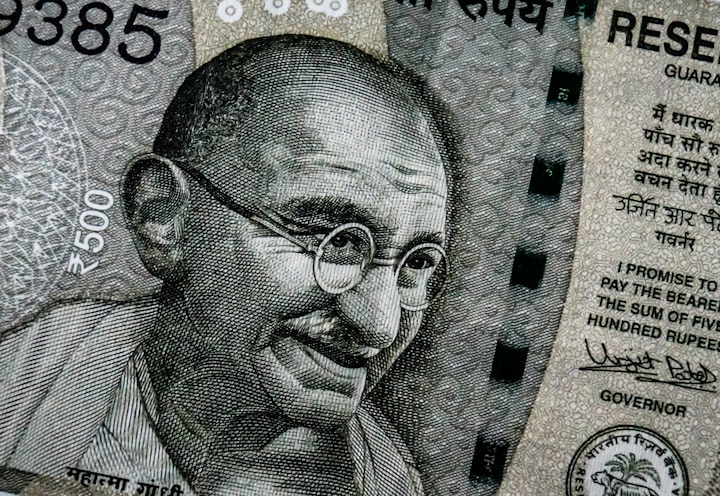Surdas and the sweeper
There once lived a seeker of God called Surdas. He was eager to study and understand Spirituality (knowledge about God). He approached a Guru and requested that the Guru teach him spiritual practice, so that he could get close to God.

The Guru was well aware of Surdas' defect of anger. He knew that this would prevent Surdas from feeling closeness with God. So the Guru decided to first prepare Surdas before teaching him serious spiritual practice. So the Guru replied, "Dear Surdas, chant the God's Name during all your activities, for a month. Then take a bath and come back to me."
Starting the very next day, Surdas chanted the God's Name during all his activities. After a month, he went to a river, took a bath and put on fresh clothes to visit the Guru. On the way to the Guru's ashram (hermitage), his clothes got dirty as a sweeper was sweeping the street carelessly. Surdas was furious and shouted at the sweeper, "What you are doing, you fool? Now I have to go back, wash and dry these clothes and bathe again! Such waste of time!"
The Guru had observed the scene. When Surdas reached the ashram, He said, "Dear Surdas, you are not yet ready for further spiritual practice. Chant the God's name during all your activities for another month, take a bath at the end of it and come to see me."
Surdas accepted the Guru's wish and went back to chanting along with his daily activities. When that month was over and Surdas was returning to the hermitage eagerly, a similar incident happened. This time, the sweeper accidentally brushed his dirty broom against Surdas. Again, Surdas became furious at the sweeper and again, the Guru sent him back and asked him to chant the God's Name for another month.
At the end of the third month, when Surdas was on his way to visit the Guru, something unusual happened. The sweeper saw Surdas approaching and remembered the way Surdas had berated him even though what had happened had been an accident. He noticed that Surdas was once again wearing new, clean clothes. This time, before Surdas could do or say anything, the sweeper, who was furious at Surdas, intentionally poured all the dirt from his garbage can onto Surdas' head.
But this time, Surdas joined his hands in Namaskar and said, "I thank you. You are my master. You taught me how to overcome anger." The sweeper was surprised and hung his head in shame.
This time, when Surdas reached the Guru's ashram, the Guru was waiting for him. The Guru was pleased and patted Surdas on the head, just as a mother pats a child on his achievement.
Moral: We can only imagine how irritated Surdas must have been with the sweeper, who would accidentally come in the way, when Surdas was eagerly returning to his Guru, after a whole month's effort. In our lives, we come across many such situations that anger us. As the story above shows, Surdas completely overcame his anger after three months of chanting the God's Name and by obeying the Guru. He viewed the sweeper as the master who helped him overcome his anger. We too can look at every situation as an opportunity to realise and overcome our defects. This is possible only The beautiful verse is composed by the 16th-century devotional poet, Surdas who composed and sang songs about Lord Krishna. Surdas was visually-impaired. Most of his verses have become part of the popular oral tradition in North India, particularly Braj Bhumi, the geographic area where Krishna spent his childhood.
The beautiful songs of Surdas are a window to his soul. He loved Lord Krishna dearly and wanted nothing but his union. Born in 1478 CE, he was often neglected at home because of his visual impairment. He developed an affinity for music while listening to groups of singers that passed by his house.
At the age of 6, he left home and wandered away with a group of singers. However, they soon left him alone. Yet, the young boy managed to survive and started composing poems and songs.
According to a legend, once Surdas dreamt of Lord Krishna calling him to Braj Bhumi, after which his life changed. He met his guru Shri Vallabhacharya who asked him to dedicate his life to Lord Krishna.
Thereafter, Surdas stayed in Braj Bhumi for the rest of his life and composed thousands of Krishna bhajans. Even when he was invited to places outside of this Braj Bhumi area, Surdas refused such invitations and stayed back.
Soon, he became famous for his compositions. Even emperor Akbar paid homage to him.
A divine vision
Every evening, Surdas composed a bhajan upon visiting the Krishna temple. Every day, the composition included phrases that correctly described the alankaram (attire) of the Krishan murti (deity). The onlookers and priests inevitably were taken by surprise. ‘How is he able to describe the Lord’s attire despite being blind?’ they thought.
The priests thought that perhaps Surdas is just guessing the adornments of the deity. So, they thought of doing a test: they did not adorn the deity with any attire a particular evening. When Surdas sat in the temple for bhajan, he surprised everyone again by a composition eulogizing the natural color of Krishna (meghashyama meaning dark clouds) sans the adornment. That day, everyone realized that even though Surdas was blind, he was endowed with a divine vision that enabled him to see the Divine in all his splendor.
Surdas, a poet from the Bhakti tradition
Surdas was among those saints in that era who preferred devotion and love over ritualistic worship as a means to connect with the Divine. As an expression of love for the Divine, many composed poems and songs which are still popular today.
Did you know?
Saints of the Bhakti tradition often immortalized the love between Radha and Krishna through songs. The message that even the cosmic soul longs to unite with individual souls, grew to form the foundation of the Bhakti movement. The poets of the Bhakti tradition used the word Radha to express and bring forth their bhakti, universal love for Krishna.
Surdas was a disciple of Shri Vallabhacharya who popularized the belief that even householders could achieve salvation, the kind that was assumed to be only limited to ascetics. However, Surdas composed devotional songs even before he met his guru.
His songs often talk about the love between Lord Krishna and Radha, and Lord Krishna’s playful acts as a child. He also sang praises for Lord Krishna and about the love he had for him.
Most songs of Surdas, like the one written at the beginning of this article, are about stories of Lord Krishna’s life. Ripe with vivid imagery, the verses will awe you and bring a smile to your face.
One of his most popular songs describes an incident when Krishna playfully tells Mother Yashoda that he is innocent every time she accuses him of stealing butter. The song, Maiya Mori Mein Nahi Maakhan Khayo (My mother, I did not eat the butter) has been rendered several times by popular singers and is one of the favorite bhajans of Krishna devotees. due to the strength of chanting the God's Name.





Comments
There are no comments for this story
Be the first to respond and start the conversation.